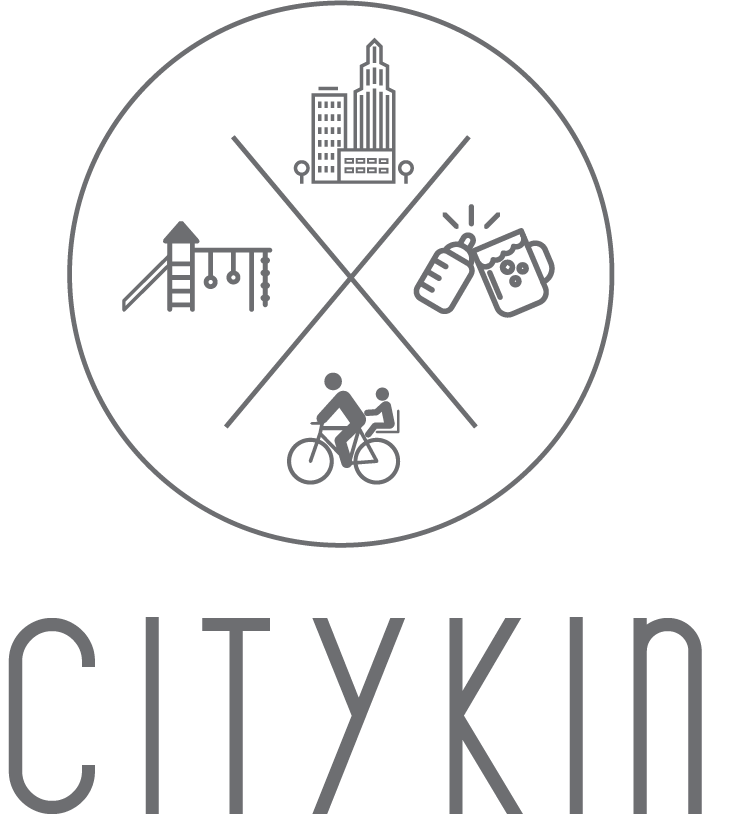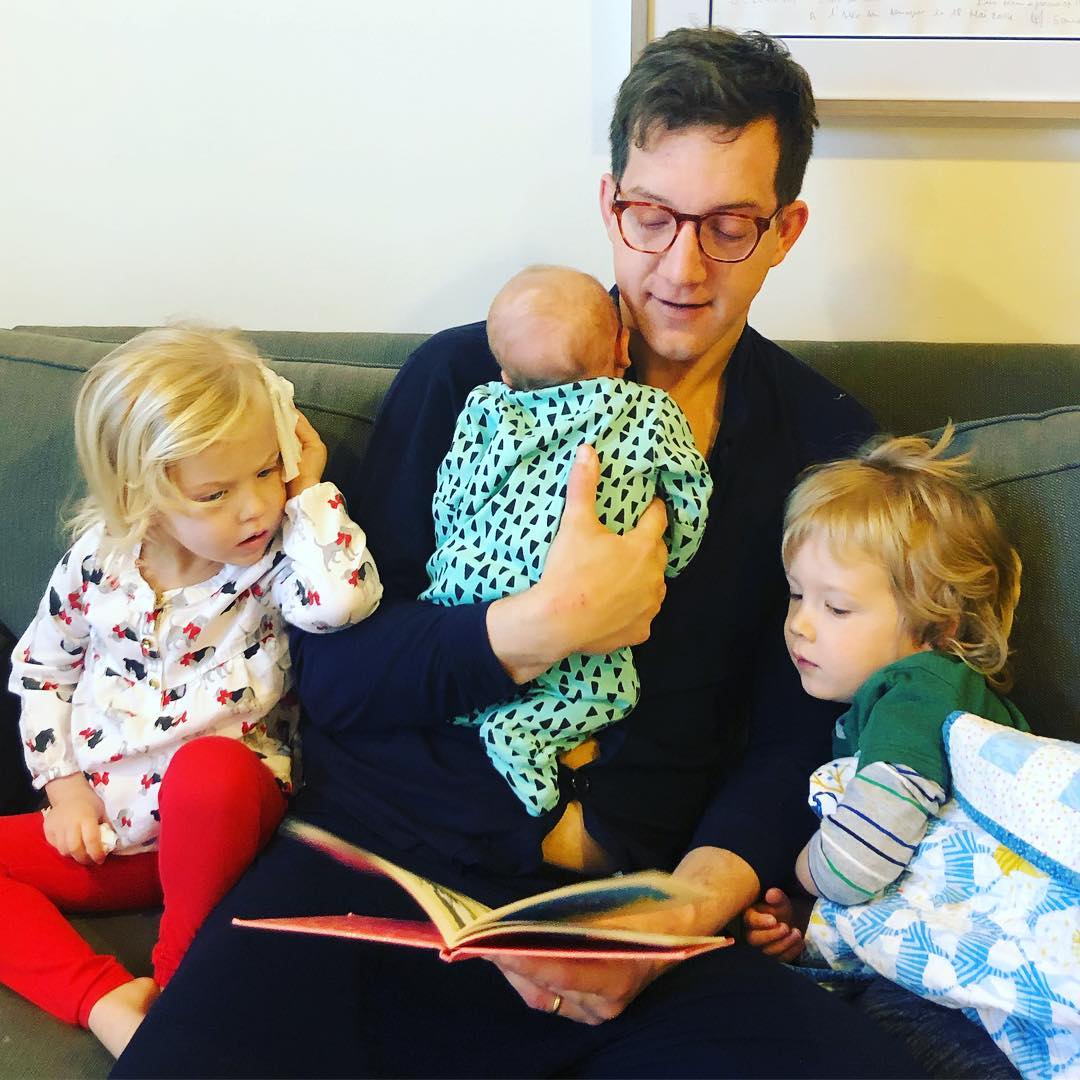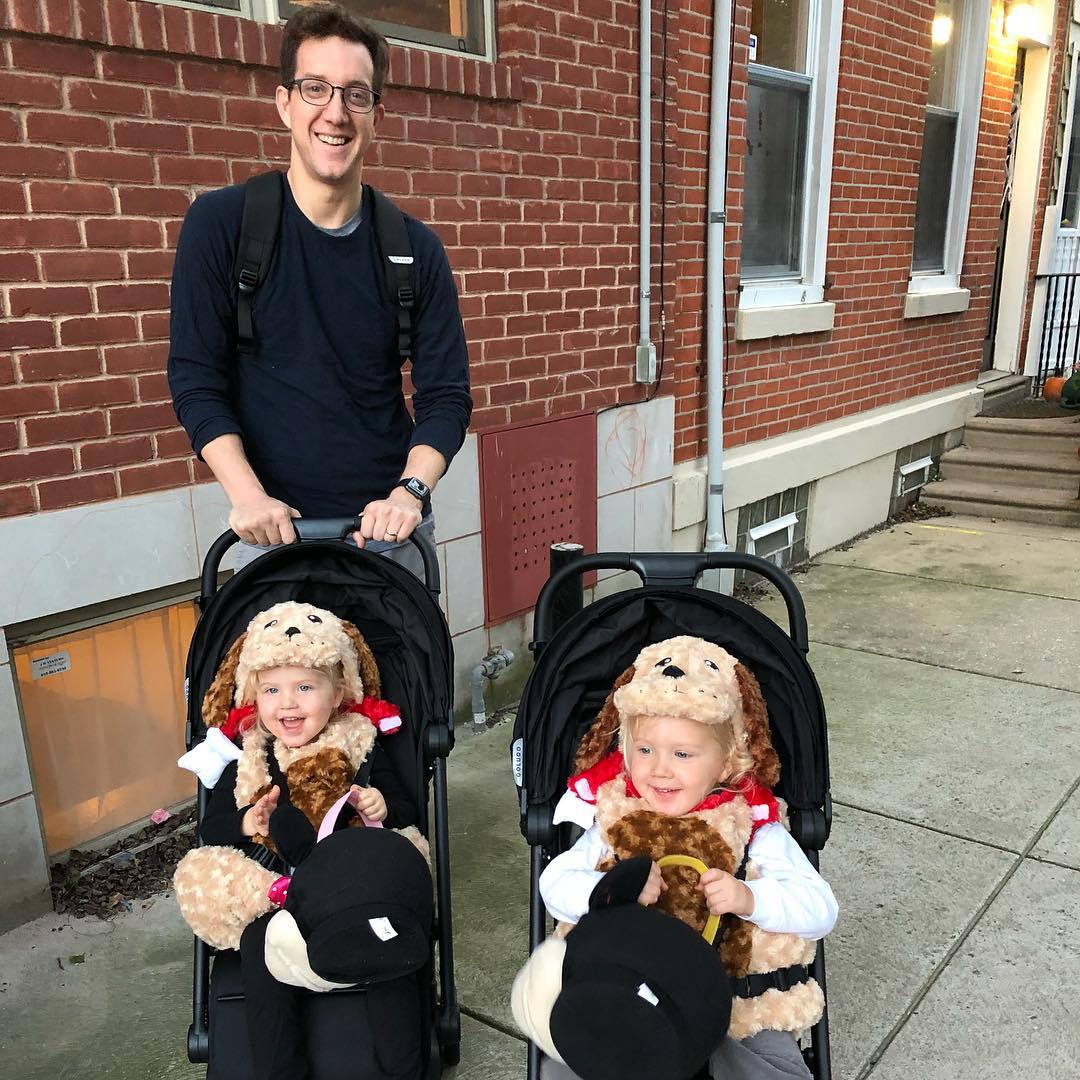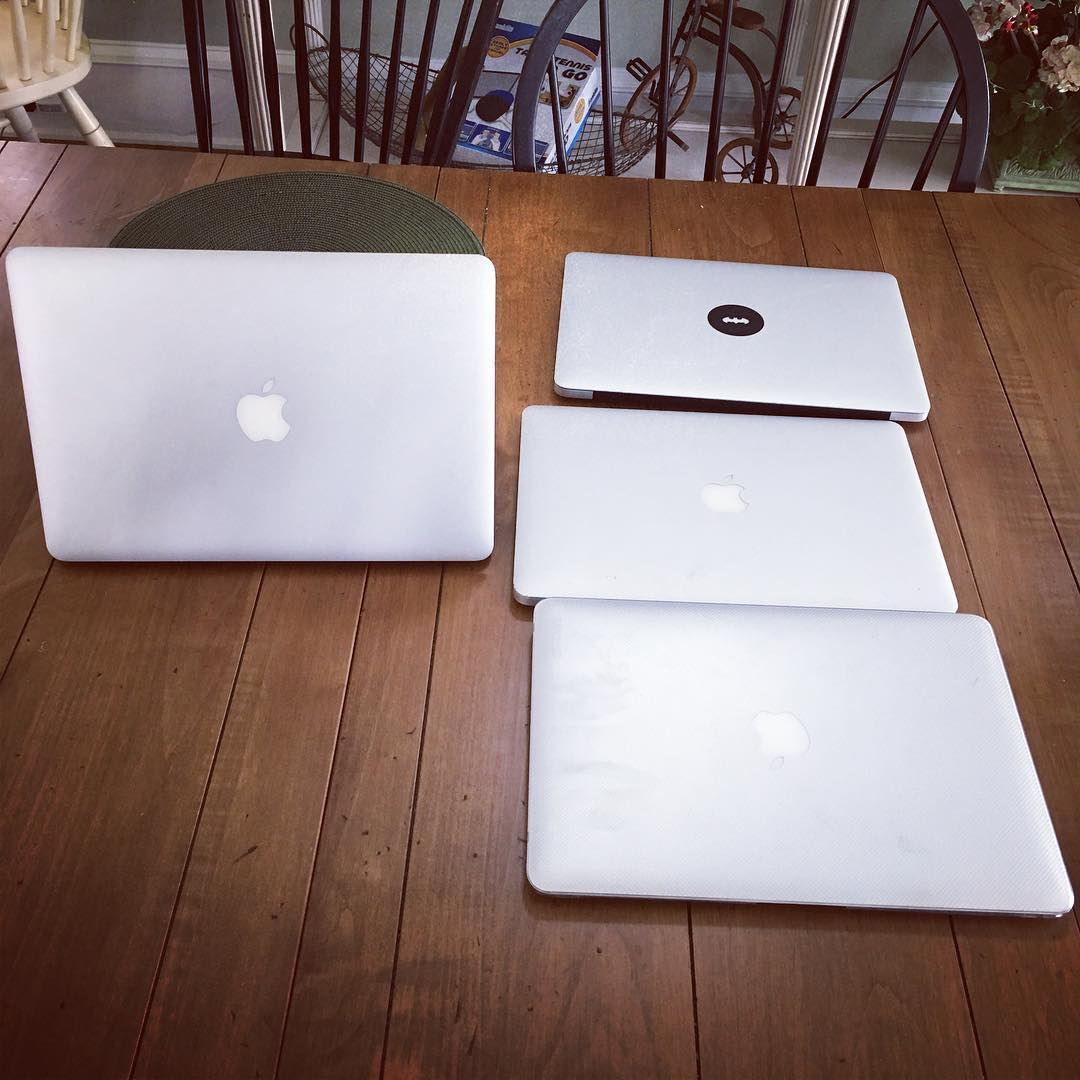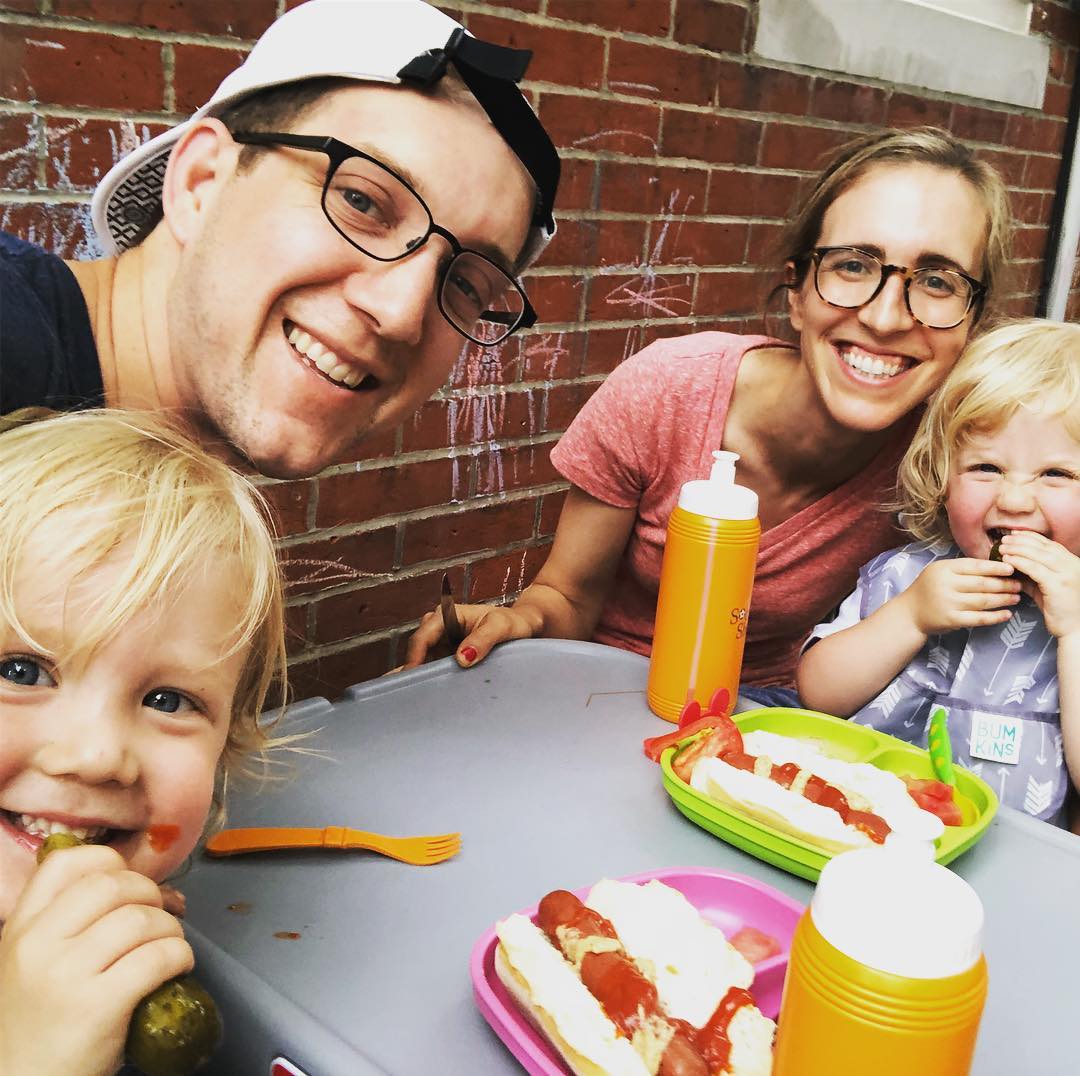A Chat With The Fed-Up Dad Who Created ‘The Warby Parker Of Strollers’ While on Paternity Leave With His Twins
For the love of God why do we need a bank loan for some of those stroller brands out there?! NOT ANYMORE!
It’s it’s broke….FIX IT! Which is what Ted did for gender parenting stereotypes and the stroller industry!
BY Ted Iobst, founder & CEO of Colugo
As far as maternity leave policies are concerned, America is straight-up embarrassing. The US remains the only country in the developed world that does not mandate employers offer paid leave for new moms. But you know what is even more embarrassing than that? The state of paternity leave in this country which is still pretty much non-existent barring a few name-brand companies. When we came across Ted, a Philly dad who was the primary caregiver for his twins when they were born we were just excited to meet a dad who TRULY understood the monotony, exhaustion and feelings of overwhelm that is typically only reserved for new moms on mat leave. When Ted told us about his big idea he had while hanging with his park mom crew and how that idea is now a company called Colugo that is being called the “Warby Parker of strollers” we knew we had met a Citykin after our own heart. Fast Company did an amazing piece on how Ted started his direct-to-consumer company after feeling the stroller industry was broken. WHY ARE SOME SO $$$$!?! And for the love of God why are we literally spending a hundred hours researching the one to get? #guilty. #allofus. Citykin caught up with Ted about gender stereotypes, his family, his business and why they are living THAT city life and not going to the burbs!
“ I’d also receive comments like ‘that must be a lot of work’ or ‘you must have not gotten much sleep while you were in school.’ I am certain that moms don’t get those same comments. Dads definitely get more credit for parenting than moms do, which I just find super unfair to moms. People would ask my wife how I handled “babysitting” the twins — which drove us both crazy. As a parent, you just learn to do what needs to be done, whether you’re a full-time working parent, a stay-at-home parent, or a student like I was. ”
What city do you live in and how many kids (ages) do you have?
I live in Philadelphia, PA. My wife, Christy, and I have three children -- 3-year-old twins (Lark and Fritz) and a 3-month-old (Henry).
Even though parent equality is much better in 2019, mom are still the default "main" parent in the eyes of society. Did you get a lot of confused questions when you were the primary caregiver to your twins?
I did get some questions. Not necessarily confused but certainly interested in why I was the primary caregiver. When I explained that I was in school and had a more flexible schedule and that it made a lot of sense for me to step in as the primary caregiver, people seemed to understand.
What I found interesting was that I’d also receive comments like ‘that must be a lot of work’ or ‘you must have not gotten much sleep while you were in school.’ I am certain that moms don’t get those same comments. Dads definitely get more credit for parenting than moms do, which I just find super unfair to moms. People would ask my wife how I handled “babysitting” the twins -- which drove us both crazy. As a parent, you just learn to do what needs to be done, whether you’re a full-time working parent, a stay-at-home parent, or a student like I was.
Did people’s confusion ever make you uncomfortable or embarrassed even though it says more about where we are at in society?
It didn’t make me feel uncomfortable or embarrassed, but rather wanting to emphasize that I didn’t do this all on my own. Even though my wife worked a full-time job (as an attorney), she was still hands-on before she left for the office and after (and of course, for overnight wakeups). We’ve been really grateful to have our families around to support us with last minute requests, weekends or date nights. Having that support was something that we knew we wanted and needed for our family, so that’s why we moved to Philly after living in DC for eight years.
Your wife has a big job...but you are OBVIOUSLY ambitious a well...how did you guys navigate those conversations when it came to professional dreams and the realities of parenting and division of labor?
It helped that our twins were born when I was in business school because I was able to be home much more than I would have been if I had a job during my wife’s maternity leave. We were both 100% hands-on from the start because we had twins and there was always something that needed to be done. To survive, we relied on routines from the start, and as things changed -- the moving from 3 naps to 2 naps to 1 -- we had detailed conversations about how to make those changes work and how to divide up tasks once my wife was back at work and I started to build Colugo.
The reality was that, at the beginning, I had more flexibility since I was in school and my wife is a law firm associate. I could skip a class, but she couldn’t miss a filing deadline. That balance has shifted overtime -- in the lead up to Colugo’s launch, for example, Christy stepped up and time-shifted her own work so that I could put my head down and sprint to ensure a successful launch.
And when one of us has to be on the road for work, Christy and I make sure to put a lot of emphasis on pre-trip prep time. So, for example, when I’m in Asia at our factories, there are certain hacks we do to prep. I’ll video record myself reading books so that it frees Christy up from having to do an hour of reading (they love Richard Scarry right now) to the kids on demand, or making sure meals are prepped in the freezer. We do whatever we can so that the one who is home with the kids can focus on them, and caring for them, rather than all the other stuff.
Dads are expected to do more today in terms of child rearing (compared to our dads or grandfathers) but they are also still expected to earn....what are your thoughts on the changing expectations of dad and how that factors into stress or pressure?
What I’ve seen is that dads may now be feeling pressure to “do it all” in a way that moms always have. I think many parents feel pressure in all directions -- they’re expected to earn, spend time with their children, and still be thoughtful and successful in the many other areas of their lives as well. For my wife and me, our roles have been very dynamic over the years. Having a single role as a parent is becoming less common with our generation as we change careers and/or choose to focus on one part of our lives more or less for a certain period of time.
What do you love best about being a dad in Philly and why does it make you excited to raise your family there?
Philadelphia is a large city, yet super livable. It has great parks, museums and restaurants. It’s also a really diverse city, and the people here are very down-to-earth. It’s easy to feel trapped in your home right after your child is born (especially with twins in the wintertime), but we have had good luck recently meeting friends at their school and in our neighborhood -- it helps to have Colugo products to help us get out. We’ve had some great cheerleaders amongst the parents at the kids’ school and it’s cool to see them rocking their Colugo products.
Philly’s also a very affordable city. As an entrepreneur, it’s great to be able to start a company and feel like you don’t have to compromise all of the other things to do it.
Love seeing a dad with THAT teething bead necklace!!! #teethingnecklacegoals
How come you guys don't move to the suburbs? Wouldn't it be easier because you'd get more space?!
We would definitely get more space if we moved to the suburbs, but right now, we’ve found a situation that works really well for our family. We’re fortunate to be in a super kid-friendly area in Philly, where there are playgrounds, an ice cream shop and a baby music class nearby. We make 5pm reservations at restaurants and the staff are unphased by the antics of a couple of toddlers. Being in a smaller home gets us outside, and we love being able to walk everywhere. It’s also helpful that Colugo’s office is just down the block. I kid you not, Colugo’s office is actually on the corner of Baby and Dog Street.
When you first told your other parent friends (especially the dads you knew) you wanted to start a stroller and baby gear company...what were their reactions?
I was pursuing my MBA at Wharton when I started pursuing the idea of Colugo seriously. What’s great about Wharton is that there are 1600+ students, and a large number of them are parents too and can relate to the problems that I was trying to solve. They were always willing to grab coffee and share their experience, so there was a lot of enthusiasm and support for the idea. Starting a baby gear company wasn’t the sexiest business idea compared to the more popular tech ventures that my classmates were pursuing, but this problem was so real to me -- I felt passionate about figuring out how to make parents lives easier...including my own :-)
Tell me what is going on with Colugo right now?
We've been really focused on our community, listening to their needs and iterating our products and developing new ones based on that. As a direct-to-consumer business, we are designed to be agile, and able to improve our product in real-time. We are launching something new next week that our team is really excited about, and think that our community of parents will be, too.
Micro Colugo squad
Did you have those moments of "does the world really need ANOTHER stroller/baby carrier?" What pushed you to do it anyway?
When my wife, Christy, and I found out that we were expecting twins, we were so delighted by the news, and excited for the adventure of getting to raise a family. But when we went shopping for gear and walked into one of those big-box baby stores, and saw hundreds of strollers lined up against the wall, it was overwhelming. And when we looked further, we realized that all of these products were overpriced, the products were overspec-ed with features that weren't actually useful, and the customer experience was subpar. The worst part was that we were left feeling as if we overpaid for products we weren’t even sure would work for us. I knew there had to be a better way, so I channeled all of my frustration with this problem to solve for it.
OK for real though...WHY are THOSE strollers (we'll remain brandless..) SO freaking expensive?! Are some really worth that price do you think about being in the industry now?
Yes, they are very expensive, but they don't have to be. Based on what I've learned over the last several years, the industry—simply put—is broken. Most brands still sell wholesale to retailers — whether it's Amazon or big box stores. That means twice the markup (or more) of what you can sell the same high quality products for through a direct-to-consumer channel.
